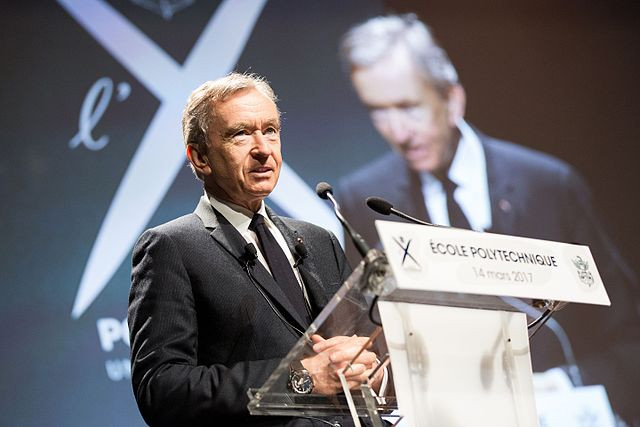While the successor to Bernard Arnault remains undecided, the equity inheritance plan for the LVMH Group is already in motion.
According to Italian fashion media MF Fashion, LVMH Group CEO Bernard Arnault had previously set up an equity inheritance arrangement for after his passing. If he were to pass away before the 25th birthday of his youngest son, Jean Arnault, the LVMH Group's shares would be transferred to the Belgian foundation Protectinvest and two Brussels-based companies.
The two Brussels companies are crucial as they directly hold about 65% of the shares of Financière Agache, the Arnault family's holding company. In July 2022, Financière Agache underwent a restructuring and is now controlled by another company, Agache Commandité SAS.
This company's shares are evenly held by Bernard Arnault's five children. However, as Jean Arnault, born in 1998, turns 25, the previous equity inheritance arrangement set by Bernard Arnault will change. In simple terms, his shares will no longer be divided between two different companies but will directly enter the family company controlled by the five children.
Through Agache Commandité, Bernard Arnault and his family members hold 48.18% of LVMH Group's shares and 63.17% of the voting rights.
Arnault's initial plan aimed to prevent disputes over shares. However, more disclosed details show that while the five children have secured their shares, there are also several restrictions. According to Agache Commandité's charter, only the direct descendants of the five children can inherit the shares, and no one is allowed to sell their shares before 2052.
Meanwhile, the charter also states that Bernard Arnault can serve as a director until the age of 95, ensuring his control over the LVMH Group for a considerable time in the future. In 2022, the LVMH Group's board of directors approved a proposal to extend his retirement age to 80.
Born in 1949, Bernard Arnault is currently 74 years old. He initially acquired all shares of the French textile and real estate group Agache-Willot-Boussac through a bank loan, which included ownership of Dior. Later, in 1989, he secured control over Louis Vuitton and several premium liquor brands.
With the support of group operations and substantial capital, Arnault embarked on a large-scale acquisition journey. Brands like CELINE, Givenchy, Fendi, and Bulgari were successively incorporated under the LVMH Group. Gucci also nearly became a part of it. Despite some controversial methods, the growth of the LVMH Group remained unhindered.
Over the past four decades, both the LVMH Group and Bernard Arnault have mutually benefited. He is undeniably the czar of the luxury goods industry-astute, efficient, yet ruthlessly decisive. He can terminate contracts with designers during downturns and overturn established agreements to reduce acquisition costs.
This embodies a strong-willed spirit. The challenge is that for many groups still controlled by the first generation, the stronger the founder, the harder it is for successors to surpass them. They face increased pressure, including meeting external expectations for growth and their ability to consolidate internal group resources.
Speculation about who might succeed Bernard Arnault has been rife over the years. However, from the disclosed inheritance plan, it's evident he doesn't favor any particular child in terms of shares. Today, a professional managerial system has been established within the various brands under the LVMH Group.
Currently, all five of Bernard Arnault's children hold positions within the LVMH Group. His eldest daughter and son, Delphine Arnault and Antoine Arnault, aged 48 and 46 respectively, serve on the LVMH board and executive committee. They also manage Dior and Berluti, Loro Piana, respectively.
Of the three younger sons, Alexandre Arnault, Frederic Arnault, and Jean Arnault, the oldest is only 31. They are still responsible for individual brand operations and have not yet been promoted to group management. Bernard Arnault has never explicitly revealed any favored successor.





